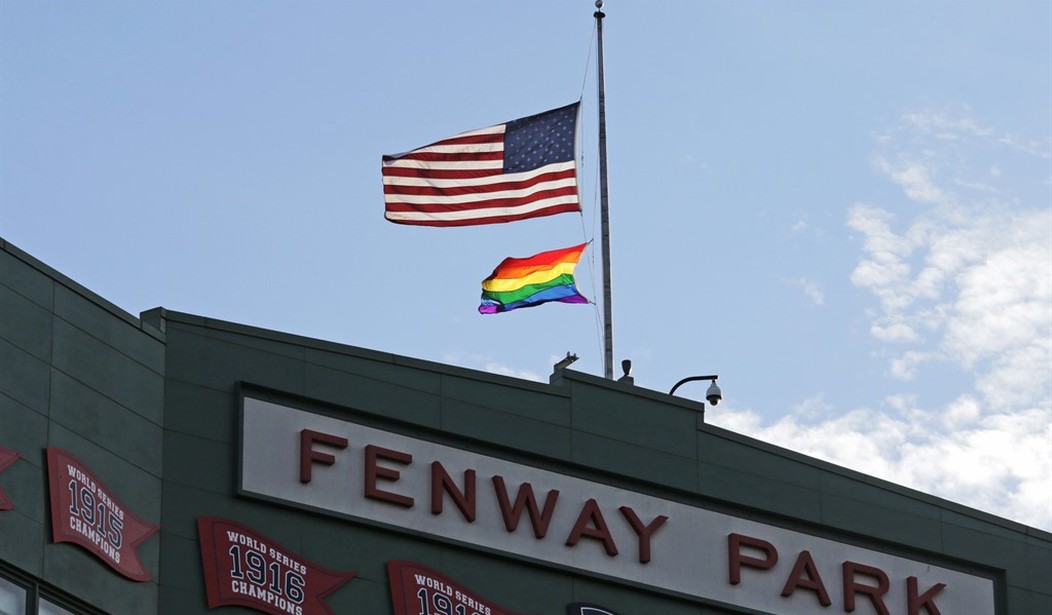I’ve been a baseball fan all my life. In fact, you can probably call me one of those baseball romantics, the kind of person who sees baseball as a sports idyll. I stuck with the Atlanta Braves through their cellar-dwelling ’80s era, which either makes me a diehard baseball fan or a glutton for punishment.
Major League Baseball has long had a reputation as being the most conservative of the “big three” sports leagues (alongside the NFL and the NBA). An older fanbase and a reverence for tradition have contributed to that reputation — which is a perception, if not a reality.
But MLB is making it harder for conservatives to be fans. Think back to last summer when Stacey Abrams and other leftists pushed MLB to move the All-Star Game from Atlanta because of Georgia’s election integrity law. I probably would’ve thrown in the towel on the majors and stuck with college baseball if the Braves hadn’t turned their season around and made it to the playoffs.
MLB has tied itself to a number of far-left causes in recent years, as Nate Hochman points out at National Review:
The league’s website now boasts a “social justice” section that promotes texts such as the 1619 Project and White Fragility — as well as authors such as Ibram X. Kendi and Angela Davis — and a number of players knelt for the national anthem during the George Floyd protests in summer 2020. In the wake of the mass shootings in Buffalo and Uvalde, the New York Yankees and Tampa Bay Rays partnered with the progressive gun-control group Everytown for Gun Safety to tweet “facts about the impacts of gun violence” rather than the usual clips and game updates during their May 26 game.
MLB teams have held “Pride Night” events for years now because, you know, everybody kowtows to the LGBTQetc crowd these days. But 20 MLB clubs have particularly focused on the “T” in LGBT recently, as Hochman revealed in some extensive investigative reporting.
Twenty-nine MLB teams hosted Pride Nights this year, with the exception of the Texas Rangers. Of those teams, 20 made some sort of overture to services that participate in the gender transitioning of children. Hochman breaks down those 20 teams into four categories, with examples of how various teams’ advocacy fits into the classifications.
Five teams fit into the category of “Medical Interventions.” The Detroit Tigers gave Pride Night patrons “a chance to support a local Pride organization of your choice” when buying tickets, including two organizations that perform gender surgeries on minors. The Boston Red Sox made a donation to an organization whose mission includes helping youth transition, while the Tampa Bay Rays made a donation to a similar group. The Milwaukee Brewers directly partnered with a group that provides hormone therapy for kids for its Pride Night (which included a pregame drag show), and the Cleveland Indians Guardians also partnered with a clinic that helps children and teens transition.
Another four teams fall into the classification of “Partnerships and Referrals.” The Los Angeles Dodgers gave half the proceeds from its raffle to a center that provides “various supportive services for Transition Age Youth, ages 16-24,” and the Pittsburgh Pirates gave to a group that promotes LGBTQ businesses, including a clinic for minors. The San Diego Padres donated Pride Night ticket proceeds to San Diego Pride, which includes empowering “our trans youth with regards to participation in athletics and access to gender-affirming health care” in its charter. The Oakland A’s gave $5 from every Pride Night ticket to the Oakland LGBTQ Center, which helps refer transgender kids for services.
Related: Brave Tampa Bay Rays Players Refuse to Play Along With ‘Pride Night’
Five teams provided “Resource Guides and Promotion” at their Pride Night games. The Cincinnati Reds worked with Cincinnati Pride, which not only helps trans youth radically alter their bodies but also promotes Planned Parenthood. The Houston Astros promoted an organization that holds informational nights for gay and trans tweens and teens and offers “resources for trans & gender-diverse youth in Texas” including “a low-cost clinic that provides gender-affirming healthcare.” The Arizona Diamondbacks, Philadelphia Phillies, and Colorado Rockies promoted organizations that provide services to transgender minors.
Finally, Hochman put six teams into the category of “Lobbying and Advocacy.” The Chicago Cubs partnered with a group that lobbied for legislation calling for Illinois schoolkids to be able to:
“describe . . . the potential role of hormone blockers on young people who identify as transgender,” “distinguish between sex assigned at birth and gender identity,” and “explain that gender expression and gender identity exist along a spectrum” by the end of fifth grade.
Across town, the Chicago White Sox partnered with an organization that lobbied for boys to be able to compete in girls’ sports. The Los Angeles Angels featured a “gender-creative” preteen who will be the Grand Marshal of the Orange County Pride Parade, while the Minnesota Twins heavily promoted a group that hosts drag queen story hours. The St. Louis Cardinals donated to an organization whose website encourages teens to “experiment with [their] gender expression,” and the Washington Nationals partnered with a lobbying outfit that also gives scholarships to transgender athletes.
All in all, 20 MLB teams advocated for transgender kids and teens this year. That’s a whopping — and depressing — two-thirds of the league that’s pushing for grooming. And, while I’m proud of my Atlanta Braves for not falling in line with radical gender theory, as a baseball fan and a conservative, I can’t help but wonder how much further to the left MLB can go.








Join the conversation as a VIP Member